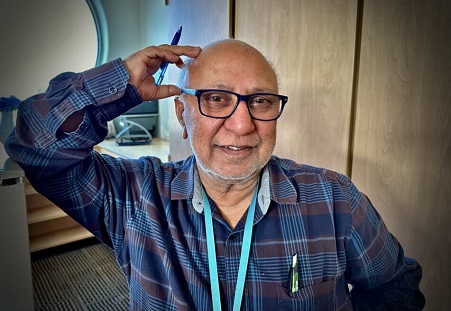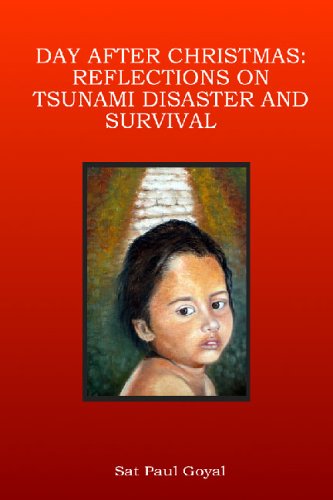AAPS Exceptional Teacher: Sat Paul Goyal, Skyline High School teacher assistant

By Jo Mathis/AAPS District News
Sat Paul Goyal joined Skyline High School in 2009 as a special education teacher assistant supporting students with learning disabilities. He later began running the school’s testing center until schools closed because of Covid-19 in March 2020. He now supports students in two or three classes each day where help is needed because of staff shortages.
Goyal was born in a small village in Punjab, India, and attended three universities to earn his bachelor’s and two master’s degrees. He became an instructor of English Literature/Linguistics at Hindu College near Delhi before moving to Ann Arbor in July of 1993, where he owned a shipping/mailing business for nine years. He worked as a substitute teacher with AAPS from 2005 until he was hired as a TA. Through the years, he has contributed articles, essays, and poetry to various publications, and in 2005, wrote the book, “Day After Christmas: Reflections on Tsunami Disaster and Survival.”
In 2006 and 2007, Goyal worked as an instructor of South Asian Languages at The Paul H. Nitze School of Advanced International Studies of Johns Hopkins University in Washington D.C.
Goyal lives in Ypsilanti with his wife, who runs a daycare from home.
How do you feel about being part of AAPS’ collaboration with Eastern Michigan University’s Paraprofessional-to-Teacher Certification Pilot Program, which creates a pipeline for working teacher assistants to earn their special education teacher certification?
I have pursued excellence in life. AAPS’s collaboration with WISD and EMU to offer a Teacher Certification Program is a laudable gesture to start this pilot project. I’m excited to go back to school! Being a teacher will put me on the other side of the aisle where I really belong. I can certainly give back much more and empower the learners if given that role. I am confident I will add some academic exuberance to the art of teaching while pursuing certification at EMU. I may write some research articles related to some linguistic areas.
What are your thoughts looking back at your career as a teacher assistant—also known as paraprofessional or TA—at Skyline?
Teaching is more of a passion than a profession for me. I’m a voracious reader and enjoy exploring the power of language as a craft. Working at Skyline certainly has impacted me as much as I have impacted learning communities. Skyline is a unique institution; its founding Principal Salura Jackson brought a different philosophy and culture to this new experiment. She had no baggage of existing schools. The Skyline library has impacted me in a big way. I have exposed my students to literary masters such as James Joyce, William Faulkner, Henry James, Virginia Woolf, etc.
When did you start writing poetry?
I have been writing poetry since 2005 and have published poetry and articles mostly in Museindia, an e-journal from India. I also contribute articles /poetry in Punjabi in Punjab Times and Punjabi Tribune.
How often do you return to India, and what do you miss most about it?
We go to India every other year. I miss weddings and other family ceremonies and festive occasions.
Do high school students enjoy writing poetry?
When I was running the Poetry Club our students enjoyed reading and creating their own poems. Some of their creations and Found Poems were displayed in the Skyline Library. Every now and then I share my poems and reflections on what is happening in the world. Recently I shared my reflections on protests in
Iran, the Ukraine-Russia conflict, Stormy Weathers and Environmental Challenges, Launching of
James Webb Space Telescope, NASA’s success at DART Mission, and 2022 Nobel Laureates.
Very often I go to the classrooms of other teachers with whom I have previously worked to share the news. I also share a link to such news/articles with Sky Staff.
What do you enjoy about being a teacher’s assistant—also known as a paraprofessional—at AAPS?
I have played different roles as a TA. I ran the Testing Center for 3-4 years. This allowed me to know students with learning disabilities and find ways to help them not feel guilty or ashamed to finish their tests in alternative settings.
“Knowing others is wisdom,” says Lao Tzu. Our compassion and love bring hope and hope serves as a catalyst for change and transformation. When you tell a student: “You did an awesome job on your last test and I’m sure you would do fine today. I will be around if you need any help,” this kind of assurance creates magic. The teacher merges with the student and this fusion elevates you, the student, and the moment you are enshrining by using your experience and wisdom. You are exploring and sharing the ideals of dignity and transformation in one go.
“Giving education is the most profound thing we can do. Compassion, care, and exuberance lead to joy, love, and beauty.”
Sat Paul Goyal

Goyal’s 2005 book about the tsunami disaster in the Indian Ocean coastal areas was published by Northside Publications, Ann Arbor
What do you hope to do after earning your certification in special education?
“Hope is the thing with feathers,
That perches in the soul,
And sings the tune without the words,
And never stops at all…”
–Emily Dickenson
Hope holds the future of our world and the entire cosmos. With the emergence of technology and advanced medical sciences, hope has become larger than our ordinary capacities and imagination. Hope is the engine of our consciousness and creativity. Education, like nature, offers infinite possibilities for creation and regeneration. While pursuing the certification I’m sure we will be studying the Philosophy of Education. Teachers, I think, must incorporate world traditions of wisdom and the art of giving into their curriculum and daily teaching practices. A teacher is always on the giving end.
In his iconic and most celebrated 434-line and five-section poem “The Waste Land,” T.S. Eliot analyzes the despair and desolation of the post-war generation and finds a three-word solution to this malaise in “Data, Dayadhvam, Damayta,” which mean to “Give, Sympathize, and Control.”
Giving, I think, is what we need to embrace most for transcending the violence, pain, and fear we see rising in our lives. Giving education is the most profound thing we can do. Compassion, care, and exuberance lead to joy, love, and beauty.
Hope is the promise of our dignity as human beings the way a seed is the promise of blossoming. A Sanskrit mantra “Aham Brahmasmi” enshrines the equation of dignity beautifully. A simple translation is “I’m a part of the whole cosmos.” The whole cosmos is ours and each one of us, all species, and every fiber of animate or inanimate phenomena are part and parcel of our world/cosmos. Finding a connection to the entire cosmos enlarges our being to infinity and a teacher represents that cosmic affluence or richness. Once I’m on the other side of the aisle, I am sure I would provide “roots and wings” as the enduring bequests (as Goethe says) to our students. We are shaped and fashioned by what we pursue with love and passion. There is nothing higher or loftier than this opportunity AAPS, WISD, and EMU are offering me to strive for excellence in the coming months and years. Seize the day!
Hope and love change everything. We can overcome hurdles, fears, and differences by embracing care and compassion. Let us strive hard to envision a world that is tremendously regenerative and lovingly empowering. “The door is wideopen,” says Rumi, “what are you waiting for?”
“Love recognizes no barriers. It jumps hurdles, leaps fences, penetrates walls to arrive at its destination full of hope. ” — Maya Angelou

























